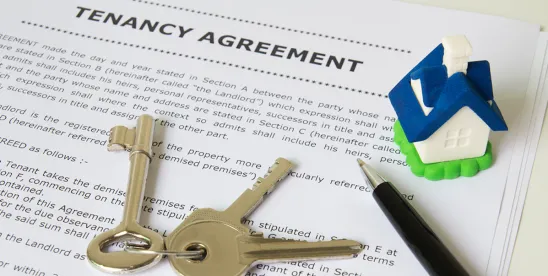Much of the commercial office market is in severe distress: Tenants pursuing new office lease transactions in today’s market should carefully due diligence their landlords and seek protections against potential landlord lease defaults.
These are rocky times for many office landlords. Office valuations continue to decline, interest rates remain high and office vacancy rates are nowhere near their pre-pandemic levels. Commercial loan maturities are looming, with approximately $1.2 trillion in loans maturing in 2024-2025. Seventeen percent of those maturing loans are secured by commercial office buildings.
In the face of these distressing circumstances, it is critical for tenants that will be signing new leases or entering into lease term extensions (New Leases) to investigate the financial stability and operational track record of their landlords. The key is to determine whether the landlords are financially stable or if they are experiencing distress due to one or more of these challenges and, if so, what protections may be pursued to safeguard that the landlords will perform their New Lease obligations.
Here are several due diligence considerations that tenants should assess before committing to a New Lease.
-
Landlord Financial Stability: To determine if a landlord is financially stable, tenants should pursue the following information (with the help of their brokers):
- whether the landlord is in default under any financing secured by the building the tenant will occupy;
- when the financing secured by the building is schedule to mature;
- if the building is fully occupied or has significant current or projected vacancy levels;
- if the tenants in the building are paying rent and the building is generating sufficient cash flow to allow the landlord to pay on a current basis its debt service and all operating costs for the building;
- whether the landlord has equity in the building (i.e., if the outstanding debt secured by the building equals or exceeds the building’s current fair market value); and
- if the landlord is experiencing distress in any other assets in its portfolio.
Tenants should also try to identify the ownership structure of the landlord entity – whether the landlord is a public company with an ability to raise additional capital or privately owned primarily by an equity fund or other private investors that may be unlikely to fund additional needed capital either to “right-size” the loans secured by the building or for building repairs/operations.
The goal of these inquiries is to verify if the landlord is stable or in distress and, specifically, whether it will have sufficient liquid capital to fund the tenant improvement/refurbishment allowance (TI Allowance), brokerage commission and other upfront costs that may be required of the landlord under the New Lease (Landlord Funding Obligations).
- Building Operations: Tenants should diligence the building condition and the quality of building operations, including these considerations:
- Is building being maintained in good condition and is the landlord current in paying building operating expenses, including common area maintenance charges?
- Are there outstanding violations involving the building’s failure to company with building codes or other legal requirements? If so, what is the landlord’s plan for addressing (and paying for) the needed repairs?
- Are there any recent or ongoing disputes between the landlord and building tenants?
- Will the landlord provide references from current or past tenants?
-
Landlord Debt Default: If the landlord is in default under the building financing, tenants should dig deeper to determine whether:
- the landlord is in loan workout discussions with its lender;
- a receiver has been appointed to take over management of the building;
- a foreclosure of the lien securing the debt is in process;
- the building is now owned by the lender (i.e., did the owner “hand the keys back”?)
- the landlord is the subject of a bankruptcy action filed by the landlord or its creditors; or
- if the landlord intends to sell the building or the lender intends to sell the note evidencing the financing (in which case, the tenant will also need to similarly vet the future building owner or note holder).
If a landlord is in loan workout negotiations or facing a receivership, foreclosure or bankruptcy actions, tenants should ensure that the terms of the New Lease are reviewed and approved by the landlord and all others having a stake in the New Lease transaction (including the building lender, any master or special servicer if the debt has been securitized, any receiver or bankruptcy trustee and any potential purchaser of the debt or the building). If the lender has taken title to the building, tenants should consider whether a move elsewhere might be better – where an alternative landlord may be more engaged in operating and maintaining the building and responsive to the New Lease terms proposed by tenants. Before electing to continue in the building, tenants should pursue discussions with the lender or its representatives about its desired terms for the New Lease to get a sense of how the New Lease negotiations will unfold and to try to get intel about the lender’s plans for the building.
- Tenant Protections: When a landlord is in (or at risk for) default under its financing or is failing to maintain the quality of building operations, tenants should consider pursuing a variety of tactics, including the following, to protect themselves and these should be documented as part of the New Lease.
- To protect against a landlord’s failure to fund the Landlord Funding Obligations, tenants can require that the landlord:
- have a creditworthy guarantor (whose financial statements have been reviewed by the tenant) guaranty the Landlord Funding Obligations;
- provide a letter of credit to backstop the Landlord Funding Obligations;
- have the landlord deposit the full amount of the Landlord Funding Obligations into an escrow account when the New Lease is signed, to be disbursed as required under the New Lease;
- give the tenant self-help rights to pay the Landlord Funding Obligations or perform other landlord obligations under the New Lease and be reimbursed by the landlord for all associated costs the tenant incurs as well as interest on the amounts that are not funded by the Landlord at a default interest rate;
- include a right in favor of the tenant to offset against rent due under the lease the amount of any Landlord Funding Obligations or other landlord obligations paid for or performed by the tenant; and/or
- where financially feasible for the tenant, decrease the rent payable under the New Lease by the amount of the Landlord Funding Obligations and instead have the tenant fund these amounts.
- At the time the New Lease is signed, tenants should require the landlord’s lender to enter into an SNDA (subordination, non-disturbance and attornment agreement), confirming the lender’s approval of the lease terms (including any rent offset rights and any other tenant protections mentioned above). The SNDA should include an agreement by the lender not to disturb the tenants’ occupancy if the landlord defaults under its financing (as long as the tenants perform their obligations under the New Lease).
- Tenants may also try to include an early termination right, allowing the tenant to terminate the New Lease before the end of its term free of any obligation to pay an early termination fee If the landlord defaults in the Landlord Funding Obligations or fails to perform maintain material building operations under the New Lease. This may be made subject to cure periods in favor of the landlord and its lender but those should be brief and run concurrently.
- To protect against a landlord’s failure to fund the Landlord Funding Obligations, tenants can require that the landlord:
The ongoing uncertainties in the commercial office market are having a disastrous financial impact on numerous landlords. As part of any New Lease transaction, it is crucial for tenants to gain a comprehensive understanding of the landlord's financial circumstances and its capabilities of performing its lease obligations to reduce the risks of significant issues for tenants down the road. The New Lease should include terms protecting tenants against these risks.




 />i
/>i

